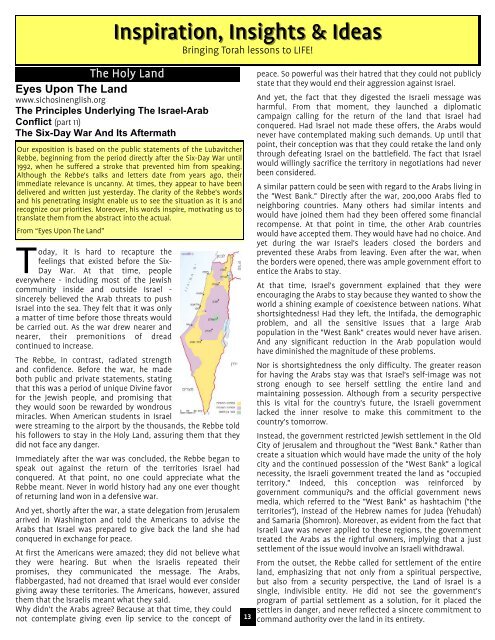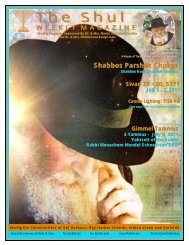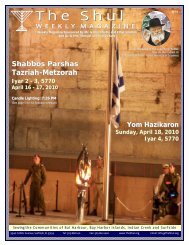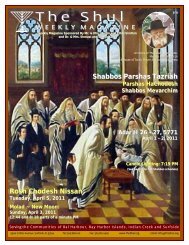Create successful ePaper yourself
Turn your PDF publications into a flip-book with our unique Google optimized e-Paper software.
Inspiration, Insights & Ideas<br />
Bringing Torah lessons to LIFE!<br />
Eyes Upon <strong>The</strong> Land<br />
www.sichosinenglish.org<br />
<strong>The</strong> Principles Underlying <strong>The</strong> Israel-Arab<br />
Conflict (part 11)<br />
<strong>The</strong> Six-Day War And Its Aftermath<br />
T<br />
<strong>The</strong> Holy Land<br />
Our exposition is based on the public statements of the Lubavitcher<br />
Rebbe, beginning from the period directly after the Six-Day War until<br />
1992, when he suffered a stroke that prevented him from speaking.<br />
Although the Rebbe's talks and letters date from years ago, their<br />
immediate relevance is uncanny. At times, they appear to have been<br />
delivered and written just yesterday. <strong>The</strong> clarity of the Rebbe's words<br />
and his penetrating insight enable us to see the situation as it is and<br />
recognize our priorities. Moreover, his words inspire, motivating us to<br />
translate them from the abstract into the actual.<br />
From “Eyes Upon <strong>The</strong> Land”<br />
oday, it is hard to recapture the<br />
feelings that existed before the Six-<br />
Day War. At that time, people<br />
everywhere - including most of the Jewish<br />
community inside and outside Israel -<br />
sincerely believed the Arab threats to push<br />
Israel into the sea. <strong>The</strong>y felt that it was only<br />
a matter of time before those threats would<br />
be carried out. As the war drew nearer and<br />
nearer, their premonitions of dread<br />
continued to increase.<br />
<strong>The</strong> Rebbe, in contrast, radiated strength<br />
and confidence. Before the war, he made<br />
both public and private statements, stating<br />
that this was a period of unique Divine favor<br />
for the Jewish people, and promising that<br />
they would soon be rewarded by wondrous<br />
miracles. When American students in Israel<br />
were streaming to the airport by the thousands, the Rebbe told<br />
his followers to stay in the Holy Land, assuring them that they<br />
did not face any danger.<br />
Immediately after the war was concluded, the Rebbe began to<br />
speak out against the return of the territories Israel had<br />
conquered. At that point, no one could appreciate what the<br />
Rebbe meant. Never in world history had any one ever thought<br />
of returning land won in a defensive war.<br />
And yet, shortly after the war, a state delegation from Jerusalem<br />
arrived in Washington and told the Americans to advise the<br />
Arabs that Israel was prepared to give back the land she had<br />
conquered in exchange for peace.<br />
At first the Americans were amazed; they did not believe what<br />
they were hearing. But when the Israelis repeated their<br />
promises, they communicated the message. <strong>The</strong> Arabs,<br />
flabbergasted, had not dreamed that Israel would ever consider<br />
giving away these territories. <strong>The</strong> Americans, however, assured<br />
them that the Israelis meant what they said.<br />
Why didn't the Arabs agree? Because at that time, they could<br />
not contemplate giving even lip service to the concept of<br />
13<br />
peace. So powerful was their hatred that they could not publicly<br />
state that they would end their aggression against Israel.<br />
And yet, the fact that they digested the Israeli message was<br />
harmful. From that moment, they launched a diplomatic<br />
campaign calling for the return of the land that Israel had<br />
conquered. Had Israel not made these offers, the Arabs would<br />
never have contemplated making such demands. Up until that<br />
point, their conception was that they could retake the land only<br />
through defeating Israel on the battlefield. <strong>The</strong> fact that Israel<br />
would willingly sacrifice the territory in negotiations had never<br />
been considered.<br />
A similar pattern could be seen with regard to the Arabs living in<br />
the "West Bank." Directly after the war, 200,000 Arabs fled to<br />
neighboring countries. Many others had similar intents and<br />
would have joined them had they been offered some financial<br />
recompense. At that point in time, the other Arab countries<br />
would have accepted them. <strong>The</strong>y would have had no choice. And<br />
yet during the war Israel's leaders closed the borders and<br />
prevented these Arabs from leaving. Even after the war, when<br />
the borders were opened, there was ample government effort to<br />
entice the Arabs to stay.<br />
At that time, Israel's government explained that they were<br />
encouraging the Arabs to stay because they wanted to show the<br />
world a shining example of coexistence between nations. What<br />
shortsightedness! Had they left, the Intifada, the demographic<br />
problem, and all the sensitive issues that a large Arab<br />
population in the "West Bank" creates would never have arisen.<br />
And any significant reduction in the Arab population would<br />
have diminished the magnitude of these problems.<br />
Nor is shortsightedness the only difficulty. <strong>The</strong> greater reason<br />
for having the Arabs stay was that Israel's self-image was not<br />
strong enough to see herself settling the entire land and<br />
maintaining possession. Although from a security perspective<br />
this is vital for the country's future, the Israeli government<br />
lacked the inner resolve to make this commitment to the<br />
country's tomorrow.<br />
Instead, the government restricted Jewish settlement in the Old<br />
City of Jerusalem and throughout the "West Bank." Rather than<br />
create a situation which would have made the unity of the holy<br />
city and the continued possession of the "West Bank" a logical<br />
necessity, the Israeli government treated the land as "occupied<br />
territory." Indeed, this conception was reinforced by<br />
government communiqu?s and the official government news<br />
media, which referred to the "West Bank" as hashtachim ("the<br />
territories"), instead of the Hebrew names for Judea (Yehudah)<br />
and Samaria (Shomron). Moreover, as evident from the fact that<br />
Israeli Law was never applied to these regions, the government<br />
treated the Arabs as the rightful owners, implying that a just<br />
settlement of the issue would involve an Israeli withdrawal.<br />
From the outset, the Rebbe called for settlement of the entire<br />
land, emphasizing that not only from a spiritual perspective,<br />
but also from a security perspective, the Land of Israel is a<br />
single, indivisible entity. He did not see the government's<br />
program of partial settlement as a solution, for it placed the<br />
settlers in danger, and never reflected a sincere commitment to<br />
command authority over the land in its entirety.














